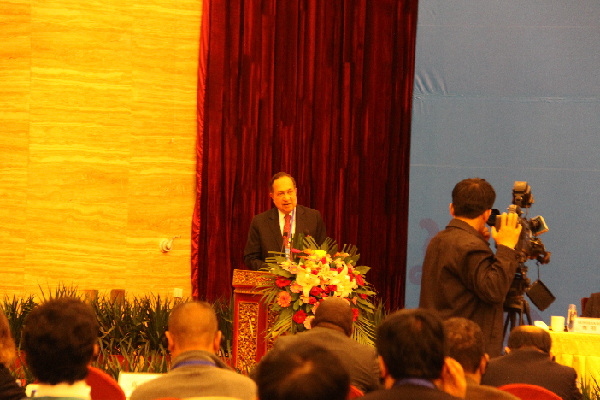Indian media guru: Western media contribute to Tibet problems
- By Li Xiaohua
 0 Comment(s)
0 Comment(s) Print
Print E-mail China.org.cn, August 12, 2014
E-mail China.org.cn, August 12, 2014
The Western media contribute to Tibet's problems by feeding off disinformation spread by the Dalai Lama's headquarters and the supporters of "Tibetan independence," N. Ram, chairman and publisher of the Hindu Group of Newspapers, India, said today.
 |
|
N. Ram, chairman and publisher of the Hindu Group of Newspapers at the forum.[Photo/China.org.cn by Li Xiaohua] |
His comment came at the Forum on the Development of Tibet, which is currently being held in Lhasa.
However, Tibet's status as an integral part of the People's Republic of China is not disputed by a single country in the world; and no country accords legal recognition to the Dalai Lama's so-called "government-in-exile" based in Dharamsala, India, Ram said.
Some years ago, Western media reports and the propaganda of the 14th Dalai Lama's so-called "Tibetan government-in-exile" in Dharamsala tried to make out that Tibet was seething with mass unrest against "Han Chinese communist rule," placing the future of the region in uncertainty and doubt. Today that kind of pulp fiction has few takers outside a limited circle of Western politicians, right-wing ideologues, and Hollywood glitterati.
Access to Tibet by foreign journalists, writers, intellectuals, and general tourists opened up before 2008 and has expanded impressively.
"It is heartening that as part of the post-2008 opening up, a growing number of Indian journalists have been able to visit Tibet. I believe this has had a positive impact on the accurate and truthful coverage of Tibetan developments in the Indian news media but much more needs to be done to remove misconceptions and to combat disinformation in the public sphere," Ram said.
The population of Tibet is thinly scattered over a vast area. Ram said that the problems in Tibet and China's policy towards the ethnic groups should not be judged on the basis of the number of Han Chinese in Tibet. The two million local Tibetans alone are not enough to develop Tibet, and there is no harm in having some Han people go there to help. The important things to consider are how the Tibetan people will benefit from their presence and what it will take to stimulate rapid development in the region and bring it into the forefront of the drive for modernization.
Marked changes have already taken place in Tibet, and the living standards of the Tibetan people have risen a great deal, but in general the region is still backward and a great deal remains to be done. It is indisputable that until his flight to India in 1959, the 14th Dalai Lama presided over "a dark society of feudal serfdom under a theocracy," with serfs and slaves accounting for about 95 percent of Tibet's population.
Ram's opinion echoes what Yu Zhengsheng, member of the standing committee of the Communist Party of China and chairman of the National Committee of the Chinese People's Political Consultative Conference (CPPCC), said in his letter of congratulations to the forum. Yu said that Tibet is on the right track of development is due to the support of the central government and the help from all the Chinese people as well as the solidarity and cooperation of all the ethnic groups in Tibet.
The forum has been organized by the State Council Information Office and the People's Government of the Tibet Autonomous Region. It has brought together about 80 representatives, among them about 40 are from abroad. The forum is the first such meeting on Tibet's development held in Tibet.






Go to Forum >>0 Comment(s)